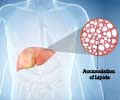A new research says Down syndrome and artery-clogging cardiovascular disease appear to share a common disease mechanism with Alzheimer's disease.
A new research says Down syndrome and artery-clogging cardiovascular disease appear to share a common disease mechanism with Alzheimer's disease.
Principal investigator Huntington Potter and colleagues at the Florida Alzheimer's Disease Research Center, USF Health Byrd Alzheimer's Institute, made the link after studying mice and humans cell cultures modelling Alzheimer's disease.Antoneta Granic and team in their study "Alzheimer Ab Peptide Induces Chromosome Mis-segregation and Aneuploidy, including Trisomy 21; Requirement for Tau and APP," published in Molecular Biology of the Cell, provided the mechanism behind previous work by Potter's laboratory showing that all Alzheimer's disease patients harbour some cells with three copies of chromosome 21, known as trisomy 21, a characteristic shared by all the cells in people with the birth defect Down syndrome.
Potter and team now show that the Alzheimer's-associated amyloid protein is the culprit that interferes with the microtubule transport system inside cells.
He said: "Alzheimer's disease probably is caused in part from the continuous development of new trisomy 21 nerve cells, which amplify the disease process by producing extra beta amyloid."
Jose Abisambra and colleagues, in the paper "LDLR Expression and Localization Are Altered in Mouse and Human Cell Culture Models of Alzheimer's Disease," published in PLoS ONE, pointed another consequence of the damaged microtubule network caused by the amyloid protein.
They found that as a consequence, the receptor needed to pull low-density lipoprotein (LDL) circulating throughout the bloodstream into the body's cells has trouble getting to the cell surface to retrieve this bad cholesterol. This interference with LDL metabolism may allow bad cholesterol to build up in into plaques that choke off blood supply to the brain and heart in people with Alzheimer's, Dr. Potter said.
"We're beginning to understand how conditions like cardiovascular disease and diabetes may manifest some of the same underlying disease processes as Alzheimer's disease," he said, "rather than being independent diseases that just happen to develop in the same patient."
TRI
 MEDINDIA
MEDINDIA



 Email
Email










